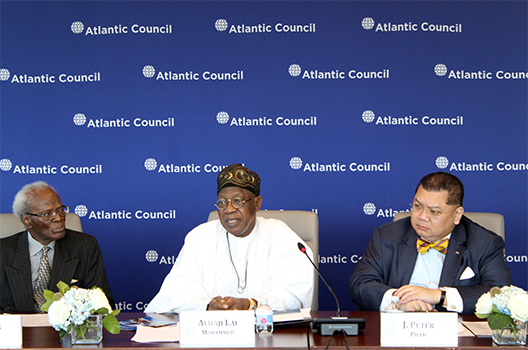On Thursday, July 19, the Atlantic Council’s Africa Center hosted a roundtable discussion with the Minister of Information and Culture of the Federal Republic of Nigeria, H.E. Alhaji Lai Mohammed.
In his remarks, Lai Mohammed discussed Nigeria’s relationship with the United States and President Muhammadu Buhari’s recent visit to Washington – the first Sub-Saharan African leader to visit the White House during President Donald Trump’s administration. He explained that this meeting was a reflection of the “warm relations” between the two countries, highlighting ongoing efforts to advance the US-Nigeria relationship in areas of shared interest such as counterterrorism, trade, and economic growth and development.
The Minister went on to address allegations of human rights violations within the Nigerian military, stressing that human rights are a “cardinal objective” of the current administration. He assured participants that all reports of human rights abuses are formally investigated, refencing the rules of engagement for counter-insurgency operations issued by the Nigerian Army. He further discussed efforts to improve the Armed Forces’ sensitivity to human rights abuses, including the establishment of human rights desks for all units and quarterly human rights dialogues, among other initiatives.
Lai Mohammed concluded his remarks with a discussion on the present status of counter-insurgency operations against Boko Haram, as well as escalating clashes between farmers and herders in the Middle Belt. He indicated that security forces are making considerable progress against terror groups, with urban areas that were once the epicenter of Boko Haram’s insurgency now much safer. However, the speaker acknowledged that clashes between farmers and herders are on the rise, driven by factors such as climate change and overpopulation. He outlined the Nigerian Government’s attempts to improve the situation through various initiatives, including ranching and intercommunal dialogue, but admitted that such a complicated issue will take time to solve.
A discussion, moderated by Atlantic Council Vice President and Africa Center Director Dr. J. Peter Pham, followed the Minister’s remarks. Topics included efforts to reintegrate rescued Chibok girls, creative solutions to address clashes between farmers and herdsmen, and allegations of desertion in the Nigerian Armed Forces following recent Boko Haram attacks.
Among those in attendance and participating in the discussion were Ambassador of Nigeria to the United States H.E. Sylvanus Nsofor; former Ambassador of the United States to Nigeria Robin Sanders; and several current and former US government officials as well as business executives and representatives of human rights and other nongovernmental organizations.
Image: Nigerian Minister of Information and Culture, H.E. Alhaji Lai Mohammed, addresses guests at the Atlantic Council. L-R: Ambassador of Nigeria to the United States H.E. Sylvanus Nsofor, Minister of Information and Culture of Nigeria H.E. Alhaji Lai Mohammed, and Atlantic Council Vice President and Africa Center Director Dr. J. Peter Pham (James Wholley/Atlantic Council)
